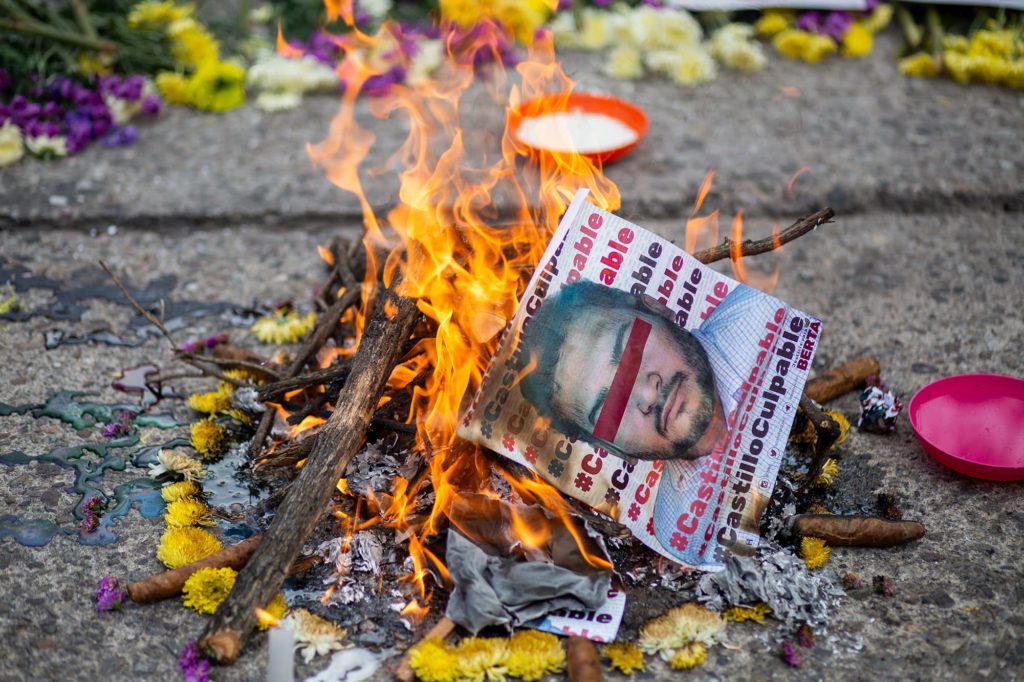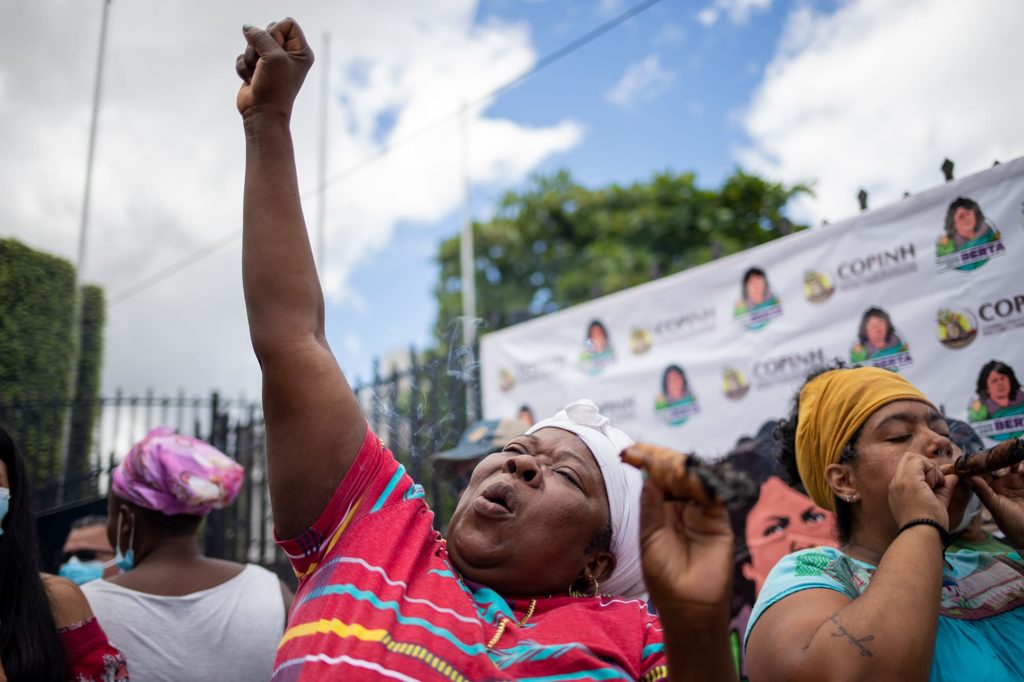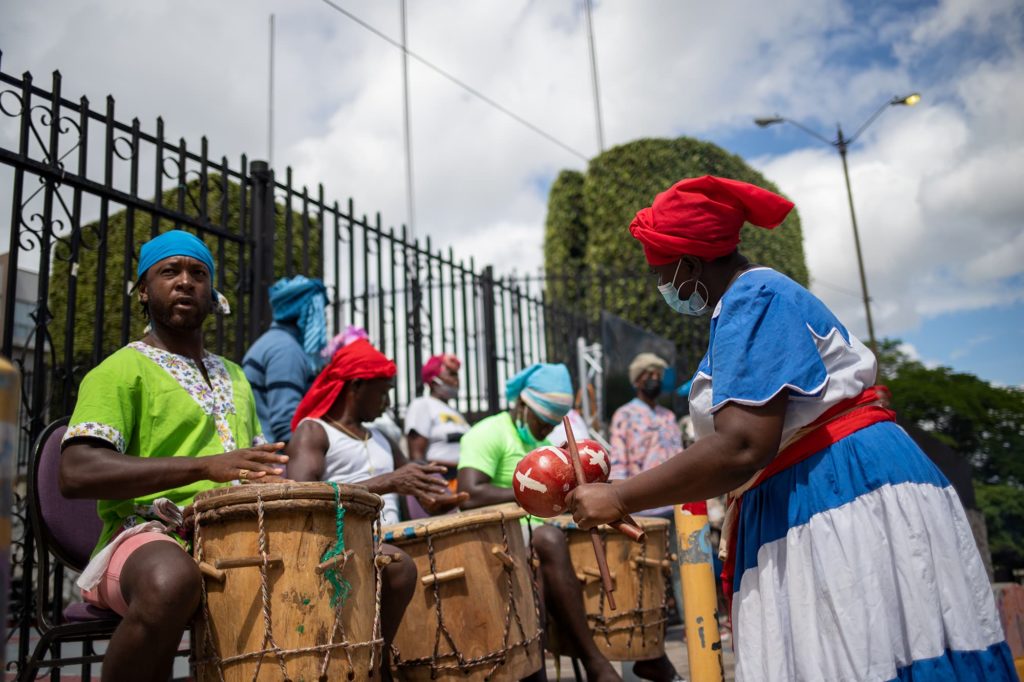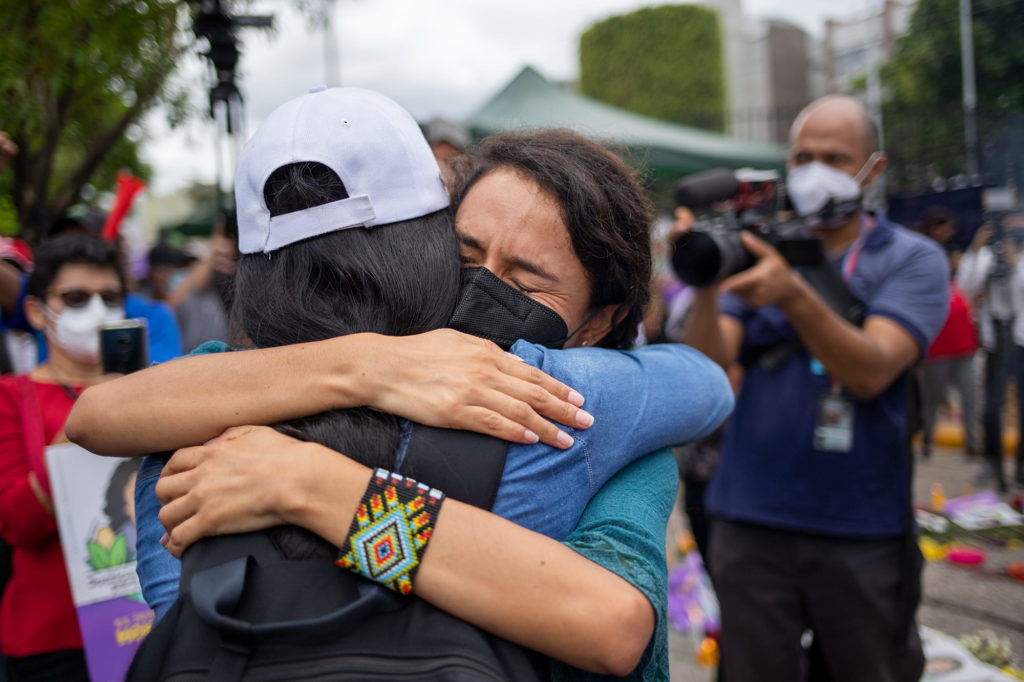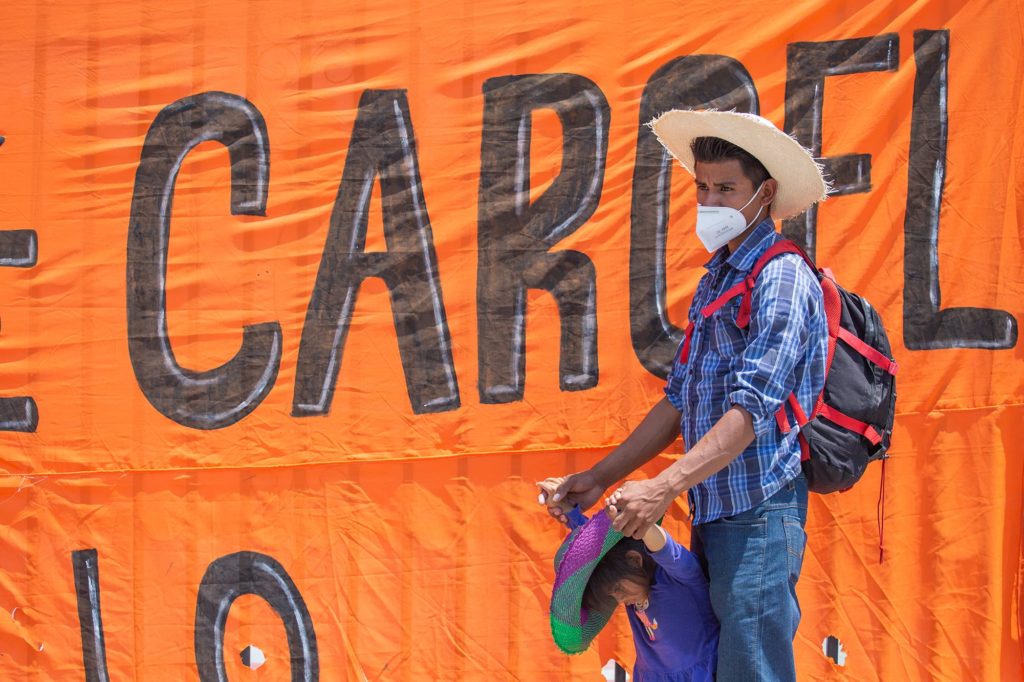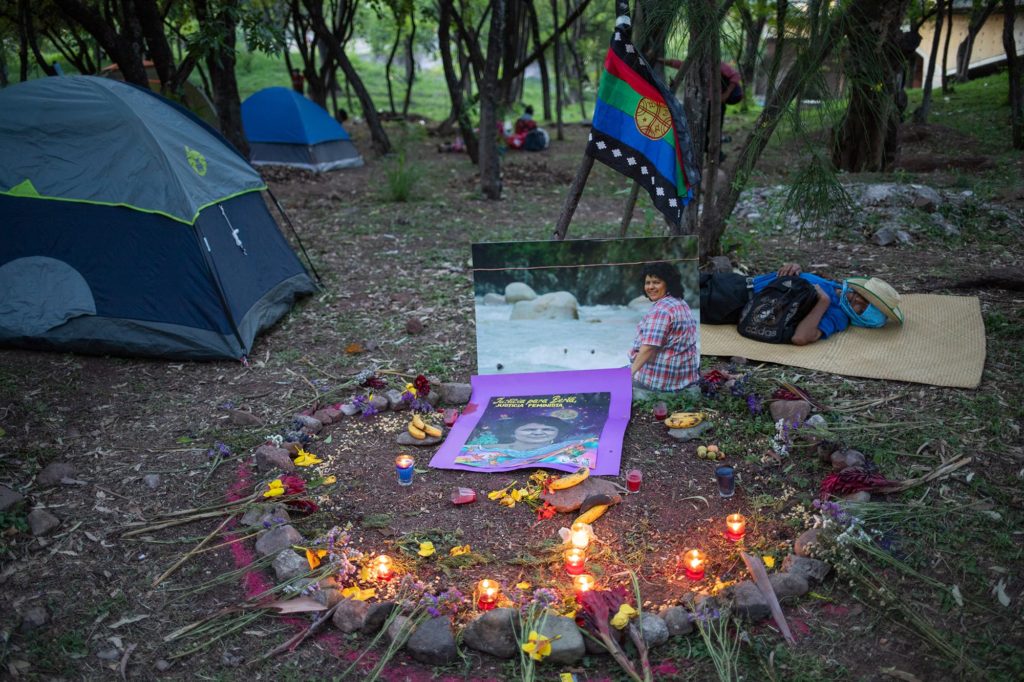A Honduran court concluded the historic trial of David Castillo Mejía, a former military officer and former president of energy company Desarrollos Energéticos (DESA), with a guilty verdict for co-authoring the murder of Berta Caceres, the indigenous leader and world-renowned environmentalist. After receiving the verdict, Castillo’s defense team vowed to take the case to international courts so that “the truth can prevail over the lies and manipulations” of the prosecution.
By Fernando Silva
Photos by Martín Cálix
Roberto David Castillo Mejia, a former Honduran army intelligence officer and the former president of energy company Desarrollos Energéticos S.A. (DESA), was found guilty of being one of the intellectual murderes of indigenous leader Berta Caceres. The night of March 2, 2016, Caceres was shot to death by a group of hired killers who attacked her home in the municipality of La Esperanza, Intibuca.
The court determined that Castillo planned and provided logistical support for the murder of Caceres in order to end her opposition to the Agua Zarca hydroelectric project being developed by DESA. This project affects the Gualcarque River, which is sacred to the Lenca indigenous people, and was financed early on by FMO, a Dutch entrepreneurial development bank.
After learning of the Castillo verdict, this bank issued a statement saying that it was “devastated” to learn that they financed a company whose CEO has been convicted of murder.
The court convened the reading of its ruling for 9:00 am on July 5, but there was still no verdict by 11:00 am. Meanwhile, the various groups chanting slogans outside the courthouse waited nervously. The “Viva Berta” camp, which included indigenous, Afro-indigenous and feminist organizations, had been following the three-month trial closely from beginning to end, and burst into tears of joy, hugs, dances, and demands for more prosecutions when the verdict was finally pronounced.
The lawyers representing the victims hailed the ruling as a small measure of justice in a country where impunity abounds, especially in murders of environmental activists.
The court unanimously concluded that the murder was the culmination of years of planning that began in 2015 with communications between Douglas Bustillo, DESA’s former head of security, and other DESA executives, including David Castillo. Their objective was to end the opposition to the hydroelectric project led by Berta Caceres and the Council of Popular and Indigenous Organizations of Honduras (Consejo Cívico de Organizaciones Populares e Indígenas de Honduras – COPINH).
In December 2019, Bustillo, the leader of the hit squad and main connection to DESA, was sentenced to 30 years in prison for the murder. The court’s decision on Castillo rejected his argument that his communications with Bustillo were about other work-related matters.
Read more (in Spanish): Seven found guilty in the Berta Caceres murder but still no justice for victims
Caceres’ daughters and their legal representative want to bring the Atala Zablah clan to justice, alleging that as DESA’s executives, shareholders, and Castillo’s supervisors, they were the driving force behind the murder of Caceres.
Castillo’s defense team issued a statement that they will file a cassation appeal with the Supreme Court of Justice to expose the irregularities committed in the public trial.
David Castillo’s strategy of getting close to Caceres
“It would be naive to think that an intelligence expert is going to plan a murder for three years, when in a country like ours you don’t need to get close to the victim. Here, the further away from the victim, the better. It makes no sense,” said Juan Carlos Sanchez, Castillo’s legal representative, in a July 1 interview with Contracorriente.
Sipping his coffee as he spoke, Sanchez said “He didn’t need to have her followed; it wasn’t necessary. The two of them met every time she came to Tegucigalpa. He knew the hotel where she stayed. It’s not in a very safe area, so if you want to harm someone staying at that hotel, the easiest thing to do is fake an assault.”
Sanchez was referring to messages discovered during the forensic analysis of phone data, which was the most damaging evidence against Castillo. The defense claimed that the messages between Castillo and Caceres revealed a friendly relationship between the two. However, the court concluded that this was just a strategy employed by Castillo to obtain information on Caceres’ whereabouts.
During the closing arguments of the trial, Castillo said that he was a Christian and respected people with different opinions, which is why he had established a friendly relationship with Caceres. He claimed that he was not the murderer, and had not provided weapons or paid any money to the perpetrators. Lastly, he denied having any political power as alleged by the victim’s representatives.
Congressperson Olivia Zúniga Cáceres, Berta’s eldest daughter, who watched all 50 days of the trial via Zoom, said that they were outraged by Castillo’s statements. “Everyone knows that a friend isn’t going to kill you. Our family received condolences from all over the world, including from Pope Francis, but we never received condolences from Roberto David Castillo.”
The lawyers representing Caceres also presented testimony in court from Berta Isabel Zuniga Caceres, another of Berta’s daughters and the current leader of COPINH. Zuniga said that her mother told her that Castillo frightened her because instead of threatening her, he always spoke amicably and watched over her.
The Facebook account used by Castillo’s family to disseminate information about the trial displayed a photo on June 25 in which Castillo and Berta were hugging. Referring to this photo, Sanchez said, “They don’t look like enemies in that photo. I wouldn’t say that they are best friends, but at least there is a cordial and trusting relationship.”
In the interview with Contracorriente, which Sanchez granted after two years of repeated requests, he said that the news media had not done a thorough job of covering the case because they did not report the defendant’s side.
Powerful forces behind the scenes
After Castillo was found guilty, the call for justice for Berta became, “The Atalas are next!” This goal seems less elusive now given the evidence presented in the Castillo trial.
DESA, the energy company directed by the Atala clan, still holds a 50-year permit granted by Honduran Ministry of Natural Resources to exploit the Gualcarque River’s resources. This permit has been investigated by the Ministry of Justice and the officials who granted it are currently facing corruption charges.
COPINH issued a statement declaring, “The Berta Caceres case does not end with this conviction. The next step is to bring the intellectual authors of this crime to justice; Daniel Atala Midence, José Eduardo Atala, Pedro Atala, Jacobo Atala and the other individuals and institutions involved.” The powerful Atala family owns financial institutions, soccer teams, real estate and other businesses. It is one of the richest conglomerates in the country.
Read more (in Spanish): Money and Politics – The Assassination of Berta Caceres
In addition to the support he received from the Atalas, Castillo’s final statement during the trial acknowledged the Honduran Association of Energy Producers (Asociación Hondureña de Productores de Energía – AHER) and the Honduran Council for Private Enterprise (Consejo Hondureño de la Empresa Privada – COHEP) for supposedly providing consultants and experts to support his defense. COHEP’s president, Juan Carlos Sikaffy, denied this, saying, “COHEP has not provided any support for Mr. David Castillo through any individual or organization.” AHER did not respond to Contracorriente’s inquiries on this matter.
An important milestone in this case was the summons issued for Daniel Atala Midence to testify in court. In the end, he never appeared in court because he is the subject of an ongoing investigation by the Ministry of Justice, based on evidence presented in the Castillo trial that implicates him in the crime.
Victor Fernandez, an attorney representing the victims, told Contracorriente, “The influence of this [Atala] family is undeniable. They are a powerful economic force and also have family and business relationships with the entire power structure of this country. We have a tremendous challenge ahead of us, but linking David Castillo to this power structure is a necessary next step for this case because [Castillo] was only a tool, as demonstrated in the trial and by other phone evidence.”
This phone evidence includes a call made by Castillo to Jacobo Atala alerting him to the arrest of Sergio Rodríguez, a DESA employee, who was convicted and sentenced in 2019 to 30 years in prison for physically participating in the murder of Caceres.
Evidence compromising the Atala family was extracted from Daniel Atala’s phone, including a message that said “I can't stand those ‘Indians’ any longer,” referring to the Lenca indigenous group led by Caceres that opposed the hydroelectric project.
Juan Carlos Sanchez doesn’t think that these messages are significant, and considers them to be normal expressions of annoyance at people who have damaged property. Sanchez believes that it would be disingenuous to say that such language is not commonly used in Honduras to refer to an antagonist. “That’s a Honduran idiosyncrasy. We can’t pretend to be saints. We use certain words because that’s the way we talk. That doesn’t mean these words represent our feelings as human beings,” he said.
While waiting for the verdict, the victims’ lawyers made statements regarding the power structure supporting Castillo. The defense team responded by accusing domestic and international organizations of orchestrating a scheme to harass and interfere with the justice system. Referring specifically to a statement made by some members of the European Parliament, Castillo’s defense team claimed, “These obvious pressures… have undertones of racism and white supremacy, as if our country was still a crown colony.”
Olivia Zúniga responded to this charge by saying “They’re not used to having justice applied to them. They believed that all this was going to play out with total impunity and without any type of investigation.”
After hearing the guilty verdict, Castillo’s mother, Dinorah Mejía, tweeted (account suspended at the time of publication) that the trial had been a farce and that “God is faithful and will bring us victory in due course.” Castillo’s defense team has announced that it will present a cassation appeal to a higher criminal court that could reverse the lower court’s decision. However, what is certain is that Castillo will be sentenced on August 3, and possibly faces 25-30 years in prison.

